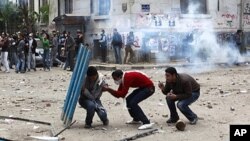Egyptian police have been battling for control of Cairo’s Tahrir Square with protesters angry at the continuing role of the military in Egyptian politics. Egyptian medics said Sunday a police and army assault on protesters killed at least nine people, raising the death toll in two days of unrest to at least 11. Hundreds more have been injured.
Protesters took to the streets of Cairo, Alexandria, Suez and beyond Sunday, battling security forces in some of the worst violence since the uprising in January and just over a week before parliamentary elections are set to begin.
“We will start our revolution again. It’s not finished yet. Understand? Not finished yet. Not the second [revolution]. The same revolution," said one protester.
Throughout the day, police fired tear gas and buckshot and, reportedly, rubber bullets, at stone-throwing protesters in the capital, as control of the square went back and forth.
While police initially led the charge, it is the military authorities - the Supreme Council of the Armed Forces - that has incurred the protesters’ wrath. They are furious at what they see as efforts by the SCAF to keep a hand in politics even under a civilian government as well as to place itself outside civilian oversight. “I just wanted to know why they do this. We came today and yesterday to ask for democracy and we don’t want the army to be over the people. I mean we make revolution to say no, we just need democracy," said another protester.
Elizabeth Arrott discuss the situation in Cairo and her close call with an angry crowd during a Skype chat with VOA's Carla Babb
In recent days the SCAF revised its position on the army’s future role. It now says what is known as the Selmi proposal is not binding.
The government held an emergency meeting Sunday evening to discuss the violence. Authorities say elections, the first since the uprising, will go ahead as planned. But some demonstrators fear the military rulers deliberately provoked the violence so that they could postpone the vote and prolong their tenure.
In any case, the drawn out process, more than three months for the parliamentary vote, up to a year to draft a new constitution, and only then a presidential election - had many in the crowd insisting the military step down now.
The chants of the crowds - "the people demand the downfall of the regime" - echoed those of the uprising that brought the military to the fore, only this time, it is ex-President Hosni Mubarak's replacement they want out.
The violence began Saturday, as police moved in to clear Tahrir Square of a few hundred people camped out after an anti-government protest Friday. The crackdown has drawn thousands of people from across the capital to help counter the offensive.
| Join the conversation on our social journalism site - Middle East Voices. Follow our Middle East reports on Twitter and discuss them on our Facebook page. |




